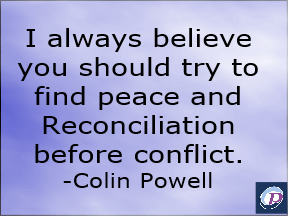
2 min readConflict With Your Colleagues
by Guy Gage | February 16, 2020 | Business, Leadership, Personal Management

There Will Be Conflict
Whenever you get people together, at some point, there will be conflict. Not maybe or might, but WILL. And when those people are smart and experienced, it will be even more so. Conflict with your colleagues is a given and if you don’t learn how to deal with it, you will always be the weak link. And if everyone around the table are weak links, you and your colleagues will continue to fight, struggle, argue, and disrespect each other.
Here’s an interesting observation: everyone has their own perspective as to the source and continuation of the conflict, and it NEVER has to do with them! You speak to one party and you get an explanation of how the other person is the reason for the discord. Then you speak to the other party and you get a similar story, only it’s the other person’s doing. Hmm.
“It Couldn’t Be Me!”
Why is it so difficult for you to see your own contributions to conflict? Mostly because it’s unpleasant to be at fault. Smart, experienced people like you are used to being right. That’s why you are successful. Being found to be wrong is foreign and you enter into unfamiliar territory. But rather than allowing yourself to experience the discomfort of being vulnerable, you turn it into a battle of good overcoming evil. In effect, you don your cape and set out to right a wrong. I WILL MAKE SURE JUSTICE PREVAILS!!
What’s really going on? It’s a simple explanation, really. Because you’ve never learned adult ways to resolve conflict, you revert back to what you know—adolescent thinking and behaving.
- “he said—she said”
- looking for being disrespected and then getting mad about it
- talking to your allies about how unreasonable the other person is
- giving the silent treatment or ignoring them
Immaturity In Conflict
When you revert to these practices, it looks like immaturity, especially to the one(s) with whom you are in conflict. (And of course, you are blind to your own immaturity that everyone else sees). You behave in ways that resemble the actions of a middle schooler rather than the esteemed and accomplished professional that you are.
Did you know that relational immaturity is often a symptom of your inability to manage your stress? When you are under continual pressure, you exhaust your mental and emotional reserves needed to rise to maturity. That’s why you and others behave like adolescents. It is so unfortunate because your unmanaged stress hinders progress and destroys relationships—the very relationships that you depend on for your success. WHAT!? Yes, it’s a vicious cycle.
Everyone Plays A Part
My experience is that everyone has a part in a disagreement. No one is totally responsible or totally blameless. Acknowledging that your communication wasn’t as clear as you thought; admitting that you misunderstood the other’s intent or pausing to avoid escalating the intensity of the moment are all ways you demonstrate that there is a better way—an adult way—to work through disagreement and conflict.
The best leaders allow a measure of grace and let people step down from their ladder of self-indignation and self-righteousness. Try it, but don’t be surprised if it isn’t responded to immediately. It takes a while for people to soften their hardness and become collaborative, so give them time. They will eventually come around and it’s a far better way than to be in conflict with your colleagues.
Read Related Blogs:
Same Goals, Near Year?
The start of a new year brings fresh goals, fresh energy, and fresh intentions. But if we’re being honest, many of those goals look suspiciously like last year’s. You know, the ones that quietly fell apart and we barely even noticed. So, before we roll out the same...
Stop Assuming Your Managers Will Figure It Out
The role of manager is often the weakest link for firms in transition. When managers fulfill their responsibilities, they create bandwidth for partners to do firm-building work, they develop staff to be competent and engaged, and clients enjoy working with them. Yes,...
What Are You Making Space for This Year?
As CPAs, we enter 2026 carrying the weight of tax and audit deadlines, not to mention keeping up with the ever-evolving regulations. But leadership isn’t just about managing compliance, it’s about creating capacity for what truly moves the needle. This year, what are...


